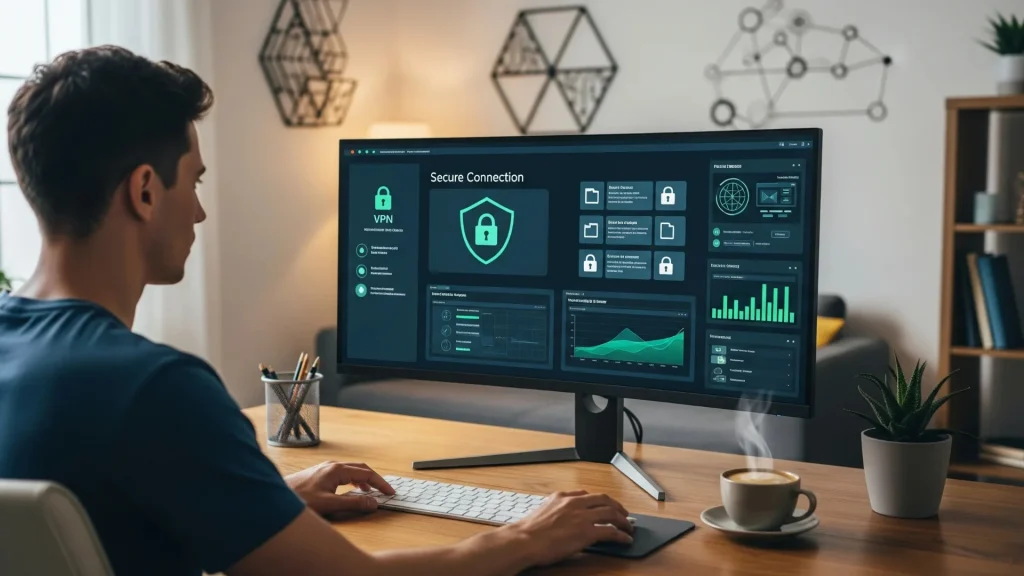Cybersecurity has become one of the fastest-growing fields in Europe and around the world. With digital threats evolving daily, companies are increasingly looking for professionals who can secure their systems, detect breaches, and respond to incidents. What’s even more interesting is the rise of remote cybersecurity jobs—roles that allow professionals to work from anywhere while managing critical security responsibilities.
Remote work has grown significantly due to the digital transformation of businesses and the adoption of cloud technologies. If you are considering a career in cybersecurity or are already in the field and want more flexibility, this guide covers everything you need to know—from popular remote job roles to must-have skills, challenges, and tips for landing a position.

Why Cybersecurity Works Well Remotely
Cybersecurity is inherently digital. Most of the work is done on computers, through cloud platforms, monitoring systems, or secure VPN connections. Here’s why remote cybersecurity jobs work
- Digital Infrastructure: Modern cybersecurity tools are cloud-based, meaning analysts, threat hunters, and pentesters can access systems without being physically present.
- Global Threat Monitoring: Cyber threats occur 24/7. Remote teams across multiple time zones can provide continuous monitoring and faster incident response.
- Cost Efficiency: Hiring remote talent reduces office overhead for companies while allowing them to access skilled professionals from anywhere.
- Flexibility: Cybersecurity roles often involve project-based tasks or incident responses, making them easier to schedule around flexible work hours.
Many European companies, especially startups and tech firms, are adopting hybrid or fully remote cybersecurity teams, highlighting the viability of remote positions in this field.
Popular Remote Cybersecurity Jobs Titles
The demand for remote cybersecurity job roles is broad, offering opportunities for both entry-level and experienced professionals. Some of the most sought-after positions include:
SOC Analyst, Threat Hunter, Pentester
- SOC Analyst: Security Operations Center analysts monitor networks for suspicious activity, investigate alerts, and escalate incidents. Remote SOC analysts often use advanced SIEM (Security Information and Event Management) tools to identify threats in real-time.
- Threat Hunter: These experts proactively search for vulnerabilities or hidden malware within a company’s infrastructure. Threat hunters combine technical expertise with analytical thinking to detect advanced threats that automated systems might miss.
- Penetration Tester (Pentester): Pentesters simulate cyberattacks to uncover vulnerabilities before real attackers can exploit them. Remote pentesters can perform penetration tests on cloud infrastructure, web applications, and networks using secure remote access.
Other remote roles in cybersecurity include:
- Cloud Security Engineer: Secures cloud environments and implements policies to prevent breaches.
- Security Consultant: Provides advice and solutions for clients remotely, analyzing their security posture and recommending improvements.
- Compliance Specialist: Ensures that the organization meets industry standards and legal requirements, such as GDPR or ISO 27001, all remotely.
These positions can often be performed entirely online, as long as you have secure access to necessary systems and tools.
Must-Have Skills for Remote Work

Working remote cybersecurity jobs requires a combination of technical knowledge and soft skills.
Technical Skills
- Network Security: Understanding firewalls, VPNs, IDS/IPS, and network protocols.
- Cloud Security Platforms: Proficiency with AWS, Azure, and Google Cloud security configurations.
- Endpoint Protection: Knowledge of antivirus, EDR (Endpoint Detection and Response), and malware analysis.
- Penetration Testing Tools: Familiarity with tools like Metasploit, Burp Suite, Nmap, and Wireshark.
- Incident Response: Ability to respond to incidents quickly, triage alerts, and follow established protocols.
Remote Work Skills
- Self-Discipline: Remote work requires managing your own schedule and prioritizing tasks.
- Communication: Clear reporting of security incidents and collaboration with distributed teams is critical.
- Tool Proficiency: Experience with collaboration platforms such as Slack, Microsoft Teams, and project management tools like Jira.
- Continuous Learning: Cybersecurity threats evolve constantly, so ongoing learning is essential.
Companies highly value candidates who can demonstrate both technical expertise and the ability to work independently while contributing to a distributed team.
How to Find and Apply for Remote Jobs
Finding a remote cybersecurity job requires strategy and persistence. Here are some actionable tips:
- Leverage Job Boards: LinkedIn, Glassdoor, Remote.co, We Work Remotely, and Indeed are great starting points. Cybersecurity-specific forums and websites like InfoSec Jobs or CyberSecJobs.com can also help.
- Networking: Attend virtual cybersecurity conferences, webinars, and meetups. Joining communities like Reddit’s r/cybersecurity or Discord groups can provide insights and leads.
- Tailor Your CV: Highlight any remote work experience, technical certifications, and skills relevant to the job. Emphasize projects or accomplishments that can be done independently.
- Certifications: Certifications such as CISSP, CEH, CompTIA Security+, and OSCP can significantly improve your chances of landing high-paying remote roles.
- Remote Interview Prep: Be ready to demonstrate your ability to work independently, communicate clearly, and handle cybersecurity tools remotely.
Persistence is key. Applying to multiple positions and actively engaging with the cybersecurity community can accelerate your chances of finding the ideal remote Remote Cybersecurity Job role.

Salary Expectations for Remote Cybersecurity Jobs in Europe
One of the most common questions for professionals exploring remote cybersecurity jobs is how much they can earn. Salaries vary depending on experience, certifications, and the country where the employer is located, but the field is generally well-paying.
- Entry-Level Roles (SOC Analysts, Junior Security Engineers): €35,000 – €50,000 annually.
- Mid-Level Roles (Pentesters, Incident Responders, Cloud Security Specialists): €50,000 – €80,000 annually.
- Senior Roles (Security Architects, CISOs, Advanced Threat Hunters): €80,000 – €120,000+ annually.
Remote cybersecurity roles often offer competitive pay compared to in-office positions. Some companies even provide additional perks such as flexible working hours, home office stipends, and learning budgets.
The demand for cybersecurity professionals in Europe continues to rise, meaning salary prospects are strong and likely to increase as threats evolve and companies prioritize digital safety.
Common Challenges and How to Overcome Them
While remote cybersecurity jobs offer flexibility and growth, they also come with unique challenges:
- Isolation: Working remotely can feel isolating. Combat this by joining online communities, attending virtual team meetings, and participating in cybersecurity forums.
- Time Zone Differences: If your team is spread across Europe or globally, coordinating can be tricky. Set clear working hours and use shared calendars to improve collaboration.
- Work-Life Balance: Without a clear separation between home and work, burnout is a risk. Establish a dedicated workspace and maintain consistent schedules with regular breaks.
- Staying Updated: Cybersecurity evolves rapidly. Set aside time for continuous learning, online courses, and certifications to stay ahead.
Overcoming these challenges ensures long-term success and satisfaction in a remote cybersecurity career.
FAQ
Q1: Can cybersecurity work be done remotely?
Yes. Many cybersecurity tasks, including network monitoring, threat hunting, penetration testing, and compliance auditing, can be performed remotely using secure tools and cloud platforms. In fact, remote cybersecurity jobs are becoming increasingly common, offering professionals the flexibility to work from anywhere while still performing critical tasks like incident response and threat detection.
Q2: What are the best platforms to find remote cybersecurity jobs?
Some top platforms include LinkedIn, Glassdoor, We Work Remotely, Remote.co, InfoSec Jobs, and cybersecurity-specific forums. Networking in professional communities is also highly effective when looking for remote cybersecurity jobs. Platforms like Remote cybersecurity jobs forums can provide valuable leads and job listings that match your skills.
Q3: Do remote jobs pay the same as office roles?
Salaries vary depending on experience, location, and company policy. In Europe, remote cybersecurity jobs often pay on par with, or sometimes higher than, office-based roles because companies have access to a global talent pool and are willing to offer competitive compensation for top talent.
Q4: What skills are required for remote cybersecurity jobs?
To succeed in remote cybersecurity jobs, you’ll need a strong understanding of network security, cloud security, incident response, and penetration testing. Additionally, remote cybersecurity jobs require good communication skills, self-discipline, and the ability to collaborate effectively with distributed teams across multiple time zones.
Q5: How can I land my first remote cybersecurity job?
To land your first remote cybersecurity job, start by building a solid foundation with relevant certifications such as CompTIA Security+, CEH, or CISSP. Gain hands-on experience through internships or freelance projects, and apply to entry-level positions. Networking with industry professionals and joining cybersecurity communities can also help you discover opportunities for remote roles.
Start Your Remote Cybersecurity Career Today
If you want to launch a successful career in remote cybersecurity jobs, the right training and guidance are essential. Bilişim Academy’s Cybersecurity Course offers hands-on experience, industry-recognized certifications, and practical skills that employers are looking for.
From understanding threat detection to mastering penetration testing and cloud security, this course equips you with everything you need to succeed in a high-demand remote role. Take control of your career, work from anywhere, and join the growing global cybersecurity workforce—enroll in Bilişim Academy today!
In collaboration with our trusted SEO and Media Planning partner, we are proud to deliver cybersecurity education supported by strategic digital expertise.




